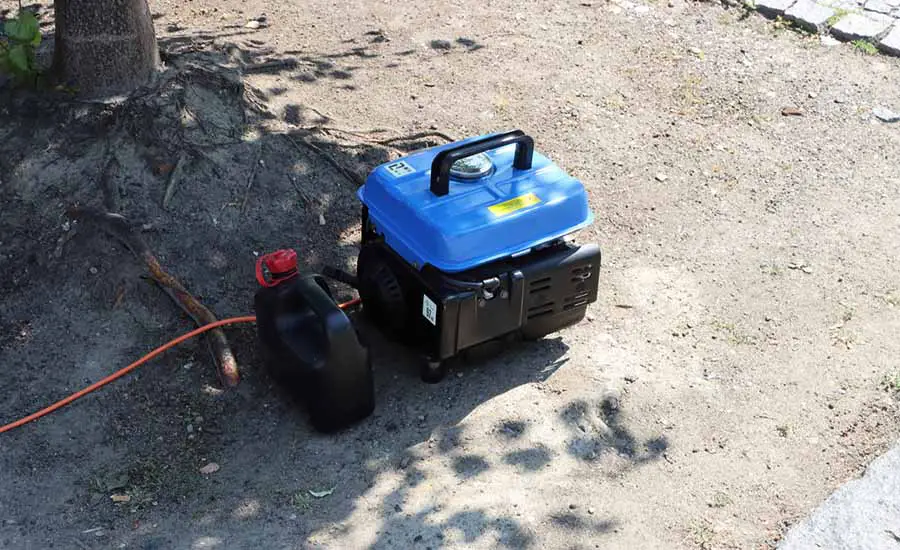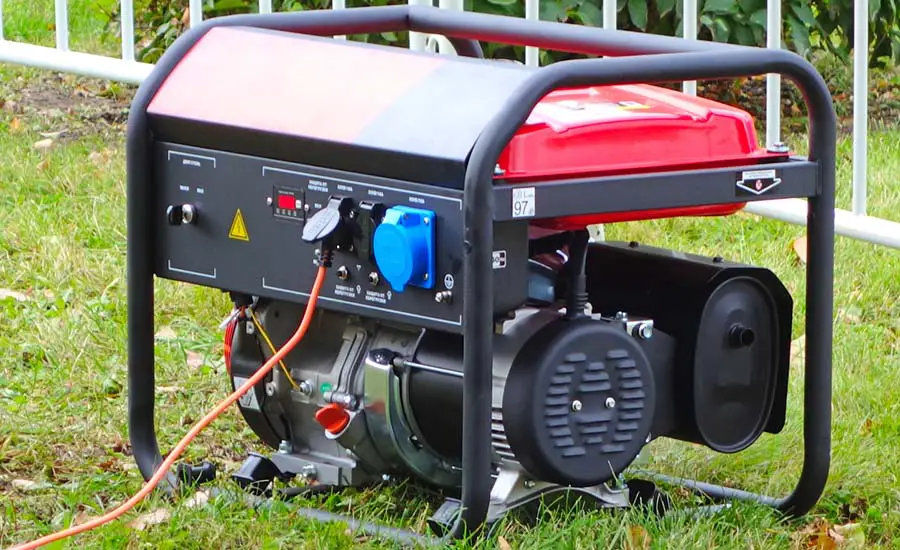
Have you ever wondered whether portable generators burn oil or not? If yes, then you’re in the right place.
All generators burn oil during use, usually 1/2-3/4 quarts every 24 hours. Most generator engines that produce below 20kW are air-cooled and burn through oil more rapidly than liquid-cooled engines. Low-oil shutdown features on many generators turn off engines when oil levels go below a certain point.
When your generator misbehaves, the first thing you need to check is its oil. However, regular generator maintenance will prevent your portable generator from either breaking down or misbehaving. Here, we focus on oil consumption by portable generators.
Do Generators Consume and Burn Oil?
Whether portable or whole house, all generators consume oil during operation. For instance, Generac generators normally consume between 1/2 to 3/4 of a quart of oil when running continuously for 24 hours. It’s in your best interest to determine the oil level every 12 hours.
When experiencing a power outage, ensure that you add some quality synthetic oil to your generator.
When checking the oil level in your generator, start by turning off the breaker. The generator should also be off. Allow the oil in the generator engine to settle before confirming the oil level.
You can then add a little oil at a time into your generator. Return the unit’s switch to its auto position. When the generator engine operates steadily, return the generator breaker to its position.
Never fill oil in the generator above the maximum level indicated on the dipstick. Using too much oil will reduce the efficiency of your engine’s lubrication system. It can also clog the unit’s air filters, thus leading to its shutdown.
How Long Does Oil Last In a Generator?
If you buy a new generator, it’ll require oil after 25 hours. Beyond that, you just dump the old oil and refill at least every 50-60 hours.
You need to change the generator oil regularly, as outlined in the owner’s manual. For large generators, you need to change the oil every 500 hours. If possible, change the filter every time you change your oil.
Why Do Generator Consume and Burn Oil?
Generators consume oil to lubricate the engine’s components so that they keep operating smoothly. Generator oil also helps to cool down the engine. Most engines have a specific oil consumption level under normal conditions.
However, there are times when your engine consumes more oil than usual. If you don’t supply your generator with the required oil to meet the increased demand, you might end up damaging its engine.
Let’s consider the reasons why your generator engine might be consuming too much oil:
Worn Out Engine Parts
If your generator has any damaged or worn-out parts, there is a high chance of leaking oil. Once that happens, your generator keeps losing oil every time it’s operating. It means you’ll have to top up the oil every time to prevent it from getting damaged.
If you notice any damaged parts in your generator, ensure you fix them immediately. It’ll save you money in the long term.
Using Bad Quality Oil
If you employ the wrong oil type in your generator, or the oil is too old and has some dirt or debris, it’ll start to burn.
For this reason, the coil won’t effectively lubricate the engine parts. It’ll therefore force your generator to consume more oil. If the generator oil starts getting black or dark brown, change it immediately.
Changing oil is an easy process that only requires new oil and about 20 minutes of your time.
High Oil Pressure
When the oil pressure gets high, oil excessively floods your generator engine. The oil might fall on the cylinder and get burnt.
High pressure could result from adding too much oil while changing the oil.
Old-Engine
Research has shown that the first five years of any engine’s service are the best. The engine requires a small amount of oil during this period since its components are still strong and new.
However, after putting enough miles on your generator, the various parts will start to cause small leaks and deteriorate. The generator will therefore use oil quickly.
Synthetic Oil
Synthetic oils are known for lubricating engines better compared to conventional oils. However, since companies formulate synthetic oils differently, they experience a different flow rate. It, therefore, means that synthetic oil can get through tighter spaces.
Synthetic oil will always offer a high consumption rate if your generator is deteriorating. You need to switch to conventional oil to stop minor leaks in such a case.
Fixing Excessive Oil Consumption
Most causes of excessive oil consumption are fixable, especially if you pay attention to the oil you’re applying and all the components working with it.
Consider selling it and investing in a newer unit if you have an older generator. You don’t have to spend a lot of money maintaining unrepairable products.
For the remaining causes, remember to apply a top-quality generator oil recommended by the manufacturer. Ensure you repair any leaks as soon as possible.
The Most Reliable Oil to Buy for Generators

The most reliable oil is one offering effective outcomes at an affordable cost. Below are some cost-effective options to consider:
Generac Full Synthetic Motor Oil 5W-30
If you’re after the most reliable and effective product on the market, the Generac full synthetic motor 5W-30 oil is the perfect option for you. The product is synthetic and comes with a mid-range viscosity.
The oil can function the same way as a very low-viscosity product in cold temperatures. It’s fortified with an additive to restrict the viscosity from forming sludge or breaking down. Any of the two can damage your portable generator or affect performance.
There is so little to hate about this oil. The only challenge is that it’s available in quarts rather than a gallon. However, the smaller size of these products means that it’s easier to travel and move around with.
You’ll also like the fact that the oil changing process is easier and less messy, thanks to an oil absorbent pad included in the unit.
The company is also highly committed to serving its customers with professional and respectful support agents available to answer your questions.
Pros
- It is designed with an oil-absorbing pad
- The product function effectively even in various temperatures
- It protects against the development of sludge
Cons
- The product is sold in quart
Briggs & Stratton 30W Oil
Briggs & Stratton is another reputable company that manufactures reliable and high-efficiency generators. The company has also invested in developing some of the best oil products in the industry.
Competent engineers have tested the Briggs & Stratton 30W oil to guarantee the highest compatibility and performance. You can also employ this oil in other generator brands.
It’s a detergent and SAE 30 generator oil, meaning that it helps prevent any contaminants such as dust from causing damage to the engine. The oil is also available in smaller sizes, ideal for small engines such as portable generators and lawnmowers.
However, you need to understand that the product doesn’t include additives to enable low-temperature applications. The product isn’t perfect for use in cold weather.
Pros
- It’s available in optimal packaging
- It prevents any contaminants from building up
- It is tested and certified by competent engineers
- The oil is the perfect option for Briggs & Stratton generators
Cons
- It isn’t ideal for operation in cold temperatures
Shell Rotella T6 5W-40
If you’re after a multipurpose and high-quality generator oil, then the Shell Rotella T6 5W-40 is the perfect option you have.
The oil is more viscous than most products you’ll ever encounter. It’s therefore suitable in high-temperature areas. Since it’s designed with a synthetic additive, it functions like a low-viscosity oil when the weather is cold.
Therefore, the oil is perfect for application in warm climates but where the temperature is likely to drop.
The oil also uses Triple protection plus formula, promoting longevity, preventing contaminant buildup, and viscosity loss. It’s mainly developed for use in diesel generators. However, you can also use it in gasoline generators.
Since you can typically only buy this oil in gallon increments, a single purchase can take a long time to finish.
Pros
- It functions well with petrol generators
- The oil offers a wide temperature compatibility
- It’s great for diesel generators
- The oil is available by the gallon
Cons
- You’re likely to experience challenges with rebate pricing
Oil Changing & Maintenance Tips
Changing and maintaining the oil level in your generator is among the simplest approaches to ensuring that it operates reliably. From generator installation to the oil change, employ the below tips to keep your generator effective and lubricated:
- After installing the generator, check its oil level. There is a possibility that your unit was shipped without oil. If the manufacturer or installer forgot to add oil, you’d have to.
- Always stick to your generator manufacturer’s instructions when it comes to oil type. Different products require different oil types depending on the fuel and engine type.
- Always consider your generator’s operating temperature. You’ll need a lower-viscosity oil for the cold temperatures, while for hot temperatures, you’ll need a higher-viscosity oil. The trick is to select a perfect viscosity for your generator engine.
- The first oil change needs to be done sooner compared to other changes. You can refer to the manual to determine the exact time to do the first oil change. You’d be surprised to learn that it’s about 8 hours to the break-in process.
- Change the generator oil at regular intervals recommended in the owner’s manual. Smaller generators require oil change as often as after 50 hours. However, larger units might require the change after 500 hours.
- If possible, you need to change the engine filter together with the engine oil.
- While refueling your generator, top off its oil reservoir if necessary.
- Keep oil filters and the extra oil on hand to be prepared to change them regularly if there is a power outage. At this time, your generator might be operating for hundreds of hours.
- Consider the atmosphere that your generator is operating in when deciding when to change the oil. For instance, a dusty job site results in dirtier oil that needs regular and changing.
- After a power outage in your home that forced the generator to operate for long hours, check the oil level and replace it if necessary. You’ll prepare the generator for the next time you want to use it.
- Most generators are designed to shut off when the oil level is low to protect the engine automatically. If the generator isn’t functioning properly, check its oil reservoir and change the oil before you institute further diagnostics.
- When performing an oil change or checking oil levels, clean any debris or dirt from your area of interest.
Generator Maintenance Tips

Most repair pros and manufacturers share tips to avoid common mistakes. Below are some critical maintenance tips you can follow.
1. Never Get Burned By Wattage Ratings
A generator has two capacity ratings. The first rating is the continuous or rated watts representing the maximum power a generator puts out on an extended basis. This is the rating you need to rely on while purchasing a generator.
There is also a starting or maximum rating, which refers to the amount of extra power a generator puts out for a few seconds when an electric such as one in the furnace or fridge starts.
You should think through everything before purchasing a generator, depending on the higher rating.
2. Stock Up on Filters and Oil
A new generator will require an oil change after about 25 hours. Beyond this operation period, you need to remove the old oil and refill it every 50-60 hours.
There is, therefore, the need to store enough factory filters and oil to last several days. You’ll, for instance, find it difficult to find the perfect filter in your nearby town after a big storm takes place.
3. Chill Out Before Refilling
Almost every generator has its fuel tank on the top of the engine to feed gas to the carburetor using gravity. However, the setup can become a disaster, especially if you refill the gas while you refuel a hot generator.
Before pouring fuel into your generator engine, allow it to cool. Try refilling the generator at night with no flashlight.
4. Running Out of Gas Will Cost You
Some generator brands, especially low-cost ones, can get damaged if they run out of gas. When the generators come to a stop, they’ll keep putting out power.
It’ll run fine but without generating power when you restart the generator. You might have to take it to a repair shop where you’ll pay around $40 to have the generator coils reenergized. Always keep the tank full and remove the electrical load before shutting down.
5. Avoid Using Old Fuel
Old fuel is the main problem that causes generator starting challenges. Most manufacturers recommend including fuel stabilizers to minimize varnish, gum buildup, and fuel breakdown. However, it won’t guarantee you against any challenges.
Most repair shops also recommend that you empty the carburetor and fuel tank once you get past the storm season. If the carburetor contains a drain, allow the engine to cool before draining it.
If the carburetor doesn’t have a drain, operate the generator until it runs out of fuel. Always go for stabilized and fresh gas in your generator.
6. Back Feeding Kills
There is a lot of information on how to back-feed power into your house’s wiring system using a dual male-ended extension cord. However, back feeding is illegal for good reasons.
It can kill neighbors, power company linemen, and family members every year. Instead of operating extension cords around your home, you can use a transfer switch.
A transfer switch costs about $300 plus an additional $1000 for installation. It, however, offers a better and safer alternative to multiple extension cords.
7. Store Gasoline Safely
Most local residential fire codes limit the amount of gasoline you can store in your home to below 10 gallons in most areas.
Even though you might want to purchase one large fuel capacity to cut down on refill runs, we don’t recommend it. There is no way you’ll pour 60 lbs of fuel without any spillage. Additionally, most generators can’t hold that much fuel.
You can instead purchase two high-quality 5-gallon cans. Consider investing in a high-quality steel gas can containing a trigger control valve.
8. Keep The Generator Clean
A generator operates from the stator and rotor, two parts found inside the unit and function together to generate power. While in operation, stators and rotors function to collect debris, dust, and other contaminants.
If you let your generator accumulate grime or dust, the stator and rotor won’t generate power efficiently. There is also a high chance of burning the two parts faster.
Like we have pointed out, you need to clean the filters regularly. Regardless of the regularity of using the generator, check the filter for dust at least weekly.
If you stay in a dusty area, increase the frequency of checking your generator. Such precautions ensure the generator is ready for operation when you need it.
Conclusion
Most generators have a low-oil shutdown feature that shuts off the engine when it detects low oil, thus protecting it from damage. As we have seen, most generator engines producing below 20kW are air-cooled and burn through oil more rapidly in extreme conditions.
When you notice any abnormal functioning of your generator, you should immediately check its oil level. However, you need to remember that regular oil replacement and engine maintenance will prevent the generator from breaking down or misbehaving.
For a reliable oil product, select any that we have highlighted above. Follow through with the oil maintenance tips strictly to achieve effective results.

